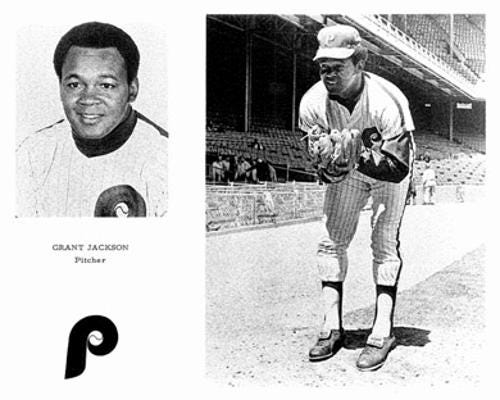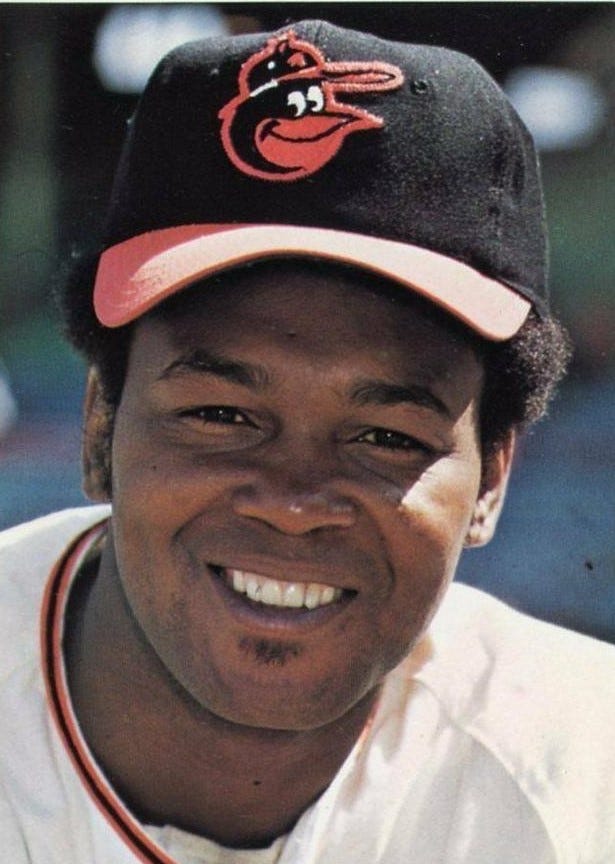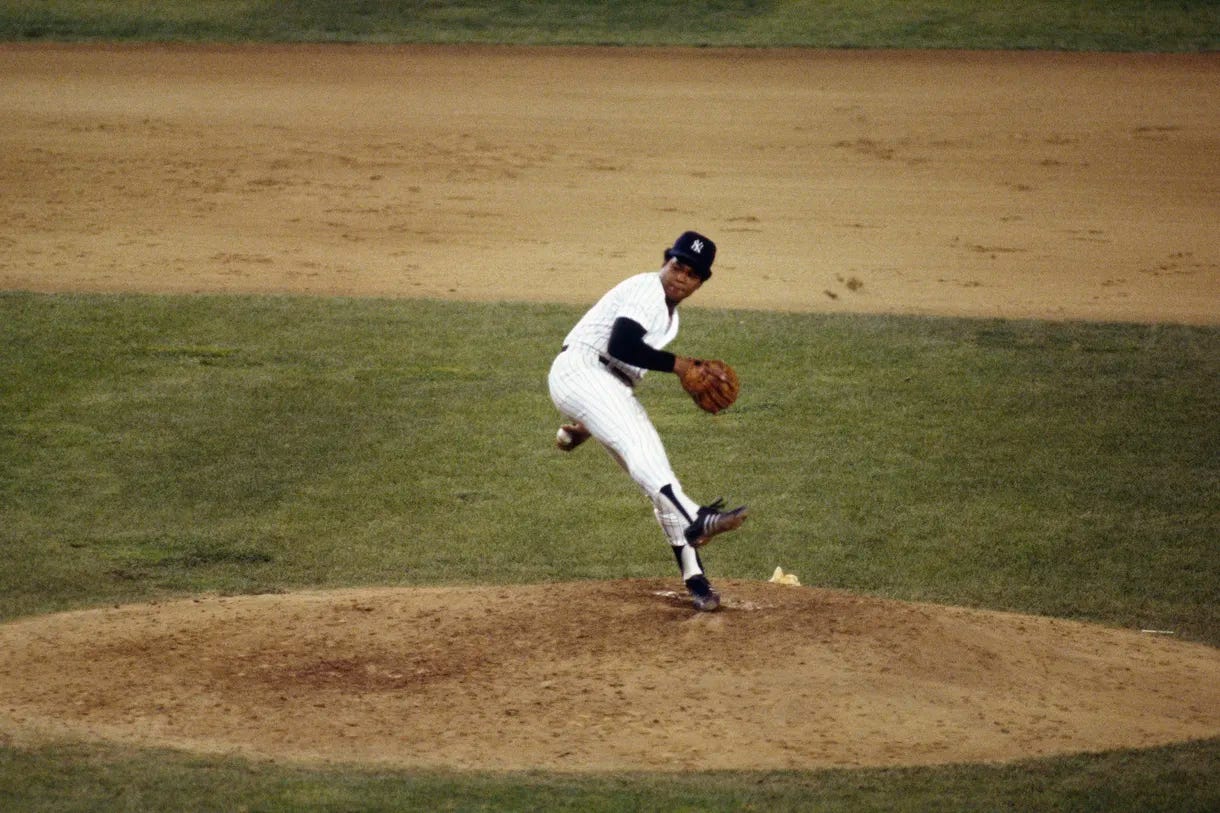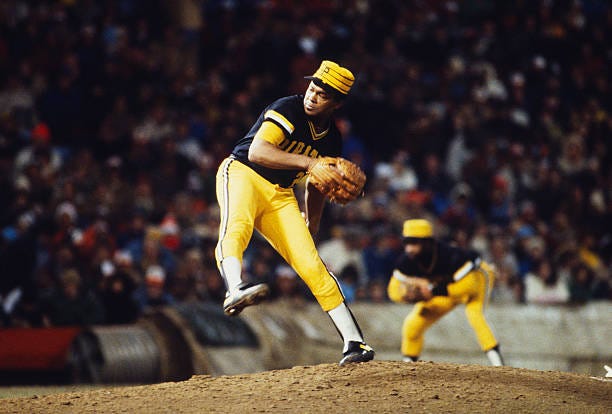
When people think of famous athletes from Fostoria, they often think of those on the gridiron. However, one of Fostoria’s most successful sons found his way on the mound. He did all of this without even having a high school team. That wouldn’t stop him from going on to be an All-Star and World Series Champion. His name, is Grant Jackson.
As a freshman in high school, Jackson was already on the varisty football and basketball squads. In a tough industrial town like Fostoria this is no small feat. By his junior year he was MVP of the football team as the star running back. He also set a school record in the shot put with a throw of 49’08. By his senior year, he was All-League in both football and basketball and set another school record in the shot put, this time with a throw of 50’06. He would also qualify for the state track meet in three different events.
On top of being a three sport star at Fostoria, Jackson also played for the town’s American Legion baseball team. On the diamond is where he saw his future. Unable to attend Bowling Green State due to grades, Jackson contacted Fostoria native and Phillies scout Tony Lucadello. Jackson signed with the Phillies organization for just $1,500.
In 1962 and 1963 Jackson played for Class C/Single A Bakersfield. His first year was a struggle, going 4-5, but he bounced back in ‘63 to 12-8. Enough to get promoted in 1964 not once, but twice. He started out the ’64 season playing in Eugene and by the end of the season was in Chattanooga playing Double-A ball. In 1965 Jackson was playing Triple-A ball in Arkansas, throwing 158 strikeouts in 155 innings pitched.
By September of that 1965 season Grant Jackson got his major league call-up. Jackson had blown through the minor league system to join the Phillies at just 22-years-old. His first major league appearance may not be one he wanted to remember. After striking out two batters, Jackson gave up a home run. He would go on to pitch two innings and give up three earned runs. It would be a bumpy road the rest of the season until Jackson’s final appearance. He was was given the start and threw a complete game, 11 strikeout game in a 3-1 win over the Mets.
In 1966, Jackson played the whole season for Triple-A San Diego with just two appearances for the Phillies. In San Diego, he threw 132 strikeouts across 134 innings pitched and had a record of 10-8. By 1967, Jackson was a full time major leaguer in Philadelphia. In 84 and a third innings pitched on the year he had 83 strikeouts and an ERA of 3.84.
While Jackson was trending up, the Phillies were trending down. In 1968 Jackson had the best ERA of his career up this point with a 2.95, but the Phillies would go on to finish 7th in the National League. New manager Bob Skinner couldn’t help the Phillies turn around their record, but he did help Jackson improve his pitching. Jackson went from a slow and methodical pitcher to a rhythmic player that could go with the flow of the game. This boded well in 1969 when Jackson made his first and only All-Star team. That season saw Jackson start a career high 35 games and strikeout a career high 180 batters.
Despite having the best season of his career, the Phillies just kept floundering. After his career year in 1969, Jackson saw big regression in 1970. Without adequete run and fielding support Jackson was stuck as a quality pitcher on a subpar team. There was no free agency at the time, but luckily after the season, Jackson was traded to the Baltimore Orioles.
Grant Jackson did not see much playing time in his first year in Baltimore. The Orioles already had four starters that would go on to win twenty games. Jackson would appear in just 29 games over the season. However, Jackson was finally a part of a winning ball club. The Orioles would win the American League pennant and earn a birth to the World Series. Jackson made just one appearance in the World Series, coming in relief in the 6th inning of Game 4. Jackson and the Orioles would go on to lose the series 4-3 to the Pirates.
By 1972 Jackson was a full time reliever. He recorded 8 saves on the year and had 34 strikeouts to just 33 hits surrended. In 1973 Jackson had the best ERA of his career with a 1.90. The Orioles again won the AL pennant. In Game 2 of the ALCS Jackson held Oakland scoreless in his one inning of relief but the bats just weren’t hot enough to catch the Athletics. The opposite was true in Jackson’s second appearance in Game 4. With the series on the line, Jackson came in to relieve in the 7th inning. He did not give up any hits while the Orioles offense soared to score 5 runs and win the game by a single run and extend the series. Unfortunately the Orioles ran out of magic and lost the series the following game.
1974 was Jackson’s best in Baltimore. He recorded a career high 12 saves on the year and helped lead the Orioles to another 1st place finish in the American League. He threw 56 strikeouts while giving up just 48 hits on the season. 1975 was backsliding year for both Jackson and the Orioles. The team took step back and finished second in the AL and Jackson had lower statistics than in the year prior.
Grant Jackson was still struggling to start the 1976 season. Needing to cut payroll, the Orioles involved Jackson in a trade to the New York Yankees. Jackson was now a part of the tremendous and turbulent Bronx Bombers. Jackson went 6-0 and had an ERA of 1.69 in that partial season with the Yankees. Jackson again would win the AL pennant as the Yankees stormed to the World Series. The Yankees and Jackson had underwhelming World Series. Jackson struggled against the Big Red Machine as the Reds swept the Yankees and Jackson was again denied a World Series title.
Following the 1976 season, Jackson was selected by the Seattle Mariners in the expansion draft. The Mariners almost immediately traded him to the Pirates. In a twist of irony, the 1977 Pirates finished second in the NL to the Philadelphia Phillies. After starting his career with the Phillies and not having team success, Jackson now was on a Pirates team that lost out on the number one seed to the Phillies. Although Jackson had improved stats in 1978, it was almost a mirror of the previous season as the Pirates finished second again to the Phillies.
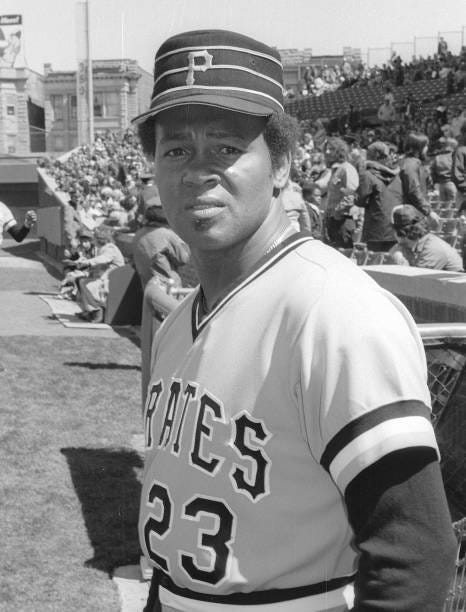
The 1979 season proved a special one. Jackson had a new career high 14 saves and had an ERA of 2.96. The Pirates finished first and Jackson was on fire. Jackson earned the win in Game 1 of the NLCS and got the hold in Game 2 as the Pirates swept the Reds. Jackson had again made the World Series, this time with his third different team. Jackson appeared in Games 1, 3 and 4 of the series. In those three games he only gave up one hit in a total of two innings pitched. However, the Pirates lost all three of those games. The series would come down to Game 7. Down 1-0 to start the game, Jackson was called in to pitch in the fifth inning. For two and two-thirds innings Jackson would throw a gem where he gave up no hits and just two runners reached base. The Pirates would go on to win the game 4-1 and Jackson would be credited with win as he earned his first World Series ring. The team that knocked him out of his first World Series, now gave Jackson the title.
The 1980 season was less kind to the Pirates. The team finished in third place despite Jackson’s 8-4 record. It got worse in 1981 as the Pirates were at the bottom of the league in a strike shortened season. In the middle of the year the Pirates sent Jackson in a trade to the Expos. Jackson would play one more season in 1982. He was traded to Kansas City to start the year and released at the All-Star break. He was picked up by the Pirates and played one final game before he retired.
Jackson would go on to coach across the majors and minors from 1983 through 2002. To this day, Grant Jackson is the only Fostoria graduate to play major league baseball.
Sources
https://sabr.org/bioproj/person/grant-jackson/#_ednref8
https://www.baseball-reference.com/register/player.fcgi?id=jackso001gra
https://www.classmates.com/siteui/places/school/Fostoria-High-School/172/gallery



